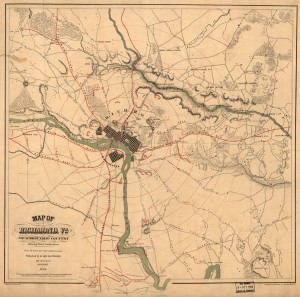Life could be dangerous for an enrolling officer, even if he was armed and had guards.
From the Richmond Daily Dispatch July 11, 1864:
Local matters.
Attempt to murder an enrolling officer.
–On Thursday last an attempt was made to murder Lieutenant Spencer Hancock, of Manchester, one of the enrolling officers for the third Congressional district, by a man named William G. Burton, residing in Chesterfield county, about eight miles from this city. Burton, who is a conscript, was sent for by Lieut. Hancock, to know the reason why he had not reported, but the guard finding him absent from home left word with his wife that he must report to the enrolling office in Manchester as soon as he returned. This was on the 5th instant, and on the 7th he drove up to Hancock’s office in Manchester, and in a very menacing manner demanded to know why he had been sent for.–Lieut. H., who was alone, replied that he only wished to know why he had not reported for military duty, and if he claimed exemption it was necessary to see the papers entitling him thereto. To this Burton got into a towering rage, swore he would not report to any man, nor would he go into the service, and then started towards the door, declaring his intention to return home.–Hancock then informed him that he was under arrest and placed himself between B. and the door; but he being a powerful man, it was a very easy matter to toss the obstruction out of the way. Hancock then ordered the guard to seize him, and at the same time drew his pistol in order to check the advances which B. was making upon him, the butt end of which he was compelled to use several times upon his head before it was possible to subdue and confine him. The physical strength of Burton was so great that it required the combined efforts of four men to effect his arrest, and while in their embrace he made repeated lunges at Lieut. H., each time dragging them some distance after him. Burton was then confined and taken before the Examining Board at Camp Lee, but learning the facts of his resistance he was ordered by the Board to be taken to Castle Thunder. Subsequently Lieut. Hancock was directed to take Burton before the Military Court Martial of Gen. Lee’s army, which was in session at Chesterfield Court House. While on the way, on foot, under a guard of two men, he seemed very penitent, confessed that he had done wrong, that Hancock had served him perfectly right, and begged that he would make it as easy with him as possible. Arriving at the first water station, in advance of the train, Lieut. H. being very feeble from sickness, determined to take the cars the balance of the way. –They then sat down on the side of the road to wait for the train, Burton (handcuffed) sitting between the two guards and Hancock a yard or two off. In a short while Lieut. H. fell asleep, but had not been so many minutes before B. sprang to his feet, jumped over the guard, and first striking him on the head with both hands and the iron cuffs, attempted to plant both heels of his boots in his forehead. Fortunately, however, the blow from B.’s fists partially turned H.’s head to one side, and the desperado’s designs were thereby thwarted in part. As it was, however, his injuries were very severe, as one of the heels of B.’s boots struck H. on the side of the head, severely stunning him and cutting his head in a shocking manner. Burton is a man weighing over two hundred pounds, and had he have jumped fairly on H.’s head, there is little doubt but it would have been crushed in. The prisoner was committed to Castle Thunder on Friday morning.
Lieutenant Hancock’s injuries are of a serious character internally, and yesterday afternoon he was suffering much from a stamp which Burton gave him in the breast.

